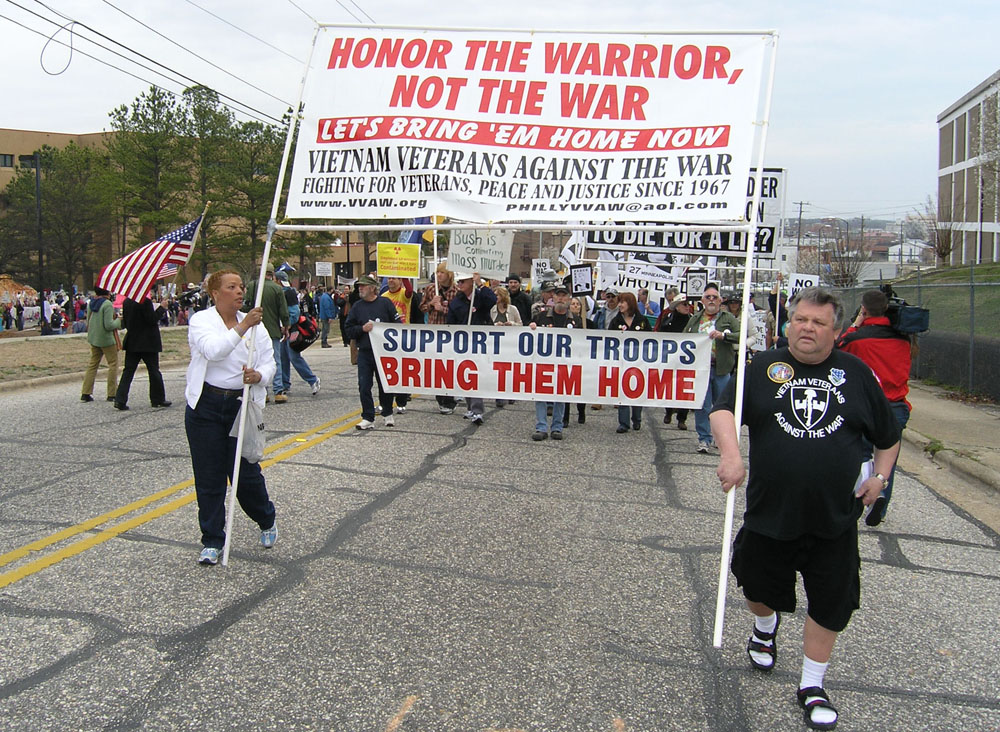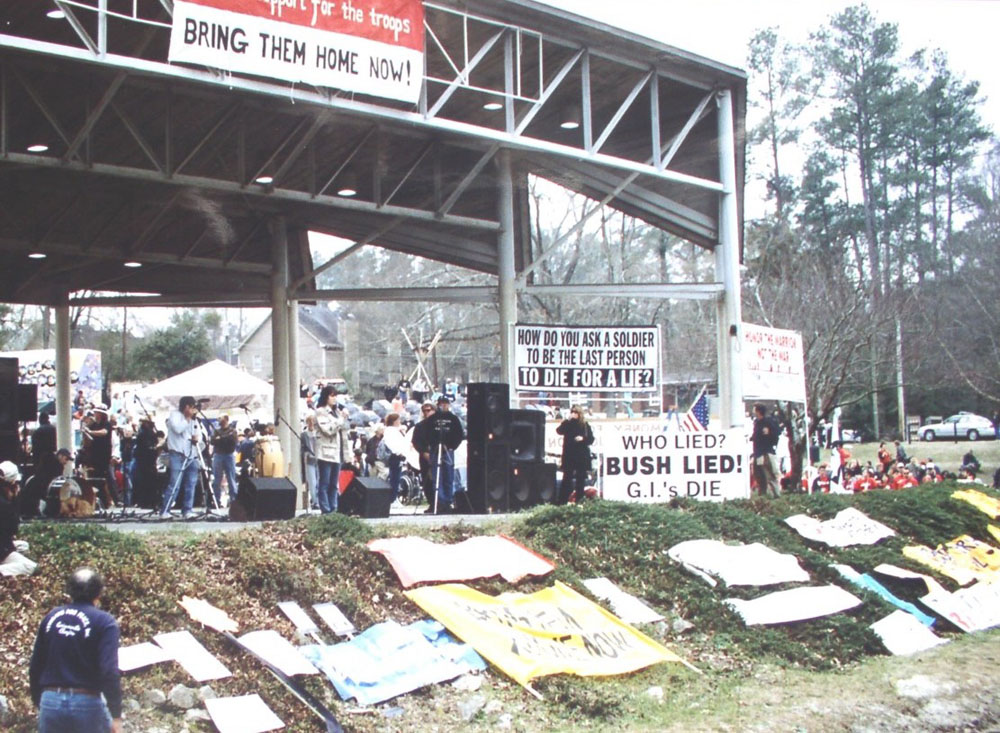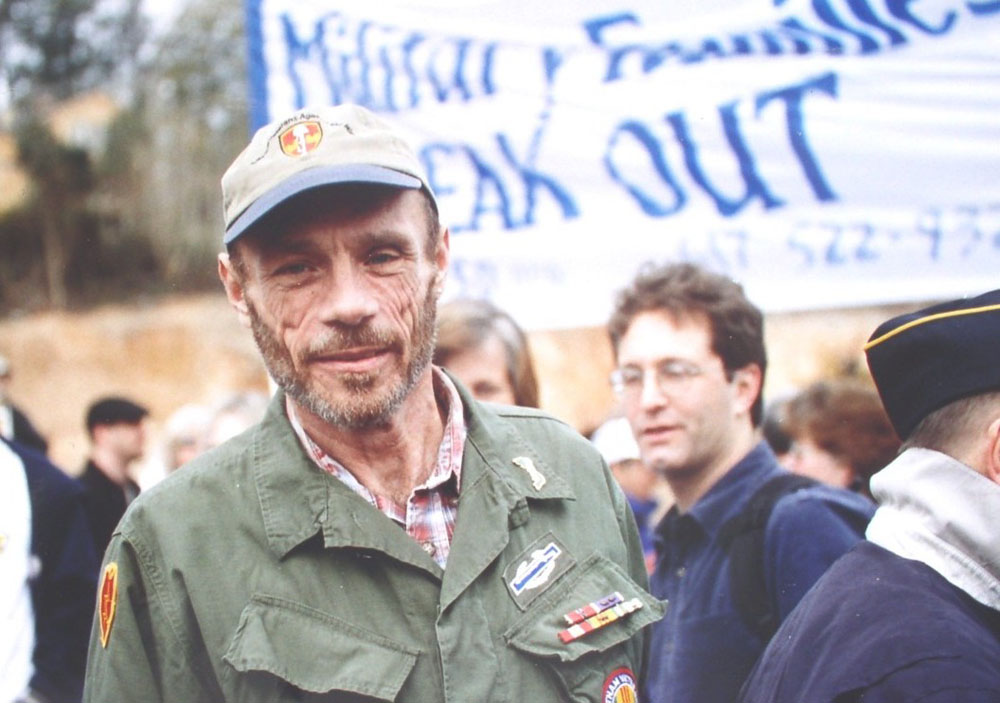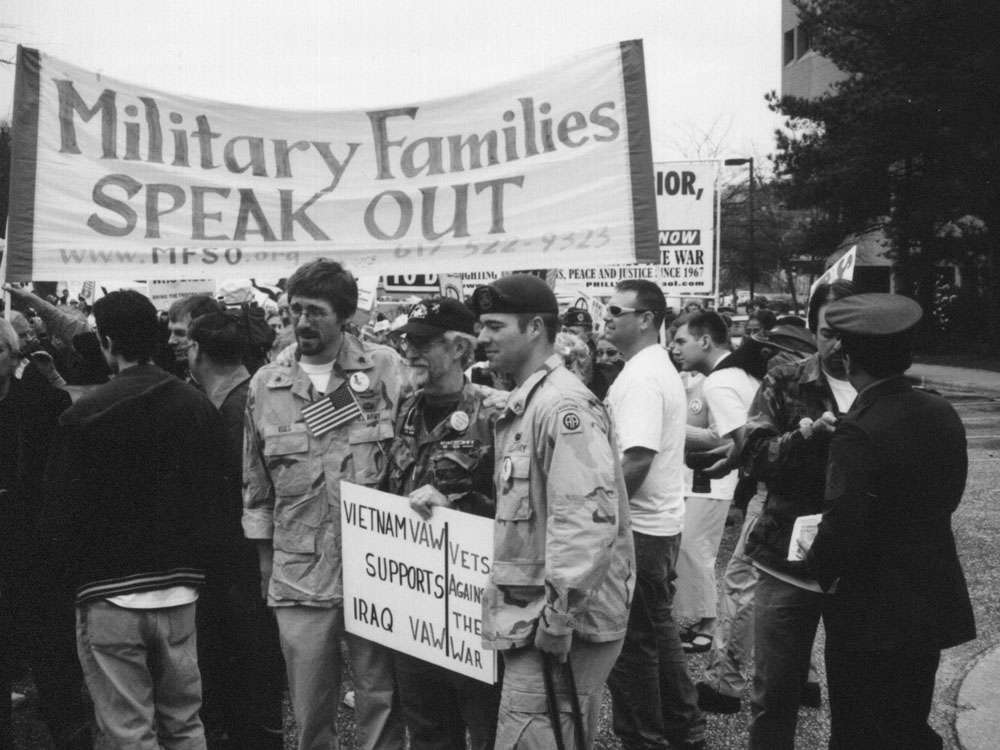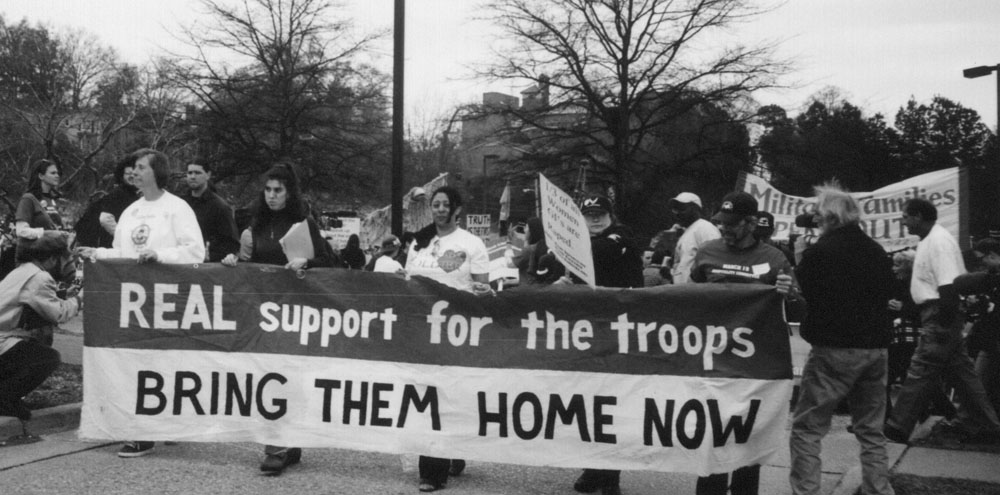 |
The Struggle Continues in FayettevilleBy Janet B. CurryThe history department of a suburban St. Louis public high school where I teach organized an all-day, in-school "field trip" on the war in Vietnam. One of the opening speakers, Barry Romo, was asked what he, as a Vietnam veteran, thought of the Iraq war. His answer was that it was every bit as much of a mistake as Vietnam, only worse, because we did not learn from Vietnam. As I considered the response of this group of about three hundred sophomores, in a school whose students voted overwhelmingly for Kerry last November, I was drawn to a minority of students who felt Romo had broken some rule, gone too far. It wasn't that he was too forceful in his delivery—they liked that; it wasn't that he was confrontational with the other speaker, who still seemed to be processing what to make of his own experience as a vet in a political context—they thought the whole thing was respectful and very relevant; it wasn't that they disagreed with Romo's politics per se—they basically agreed with him; and it wasn't the descriptions of violent events—they finished the day by watching "Platoon." It was something else they felt strongly about, but could not pinpoint, something that had to do with what should and should not happen in a school. Was it being persuaded to think critically and take major risks to pursue a resulting conviction? (Don't we already have too much homework?) Was it the nagging feeling that one's own (maximally cool) generation was becoming engulfed in the same problem as their parents' generation had? (Shouldn't they have protected us, made some progress?) Was it that even a fifteen-year-old already bears some responsibility for not having been smarter than that, more aware, more effective? How can those of us who have already learned a lot and survived our risks, more or less, open communication with those who are still unsure?
In Fayetteville, North Carolina at the March 19 demonstration to "Bring the Troops Home Now," it was clear that whatever state of indecision, fear, fascism, guilt, dread, or adolescent mortification of sticking out on Iraq policy you might meet with, there was a vast spectrum of perspectives represented among the speakers, whose insights might be the ones to make a difference in extending the attention spans of those trying not to get involved. Here are some of their messages, paraphrased. Thom Barton, GI Special: Civilian protest during Vietnam was a necessary but not sufficient part of the resistance to stop that war. The resistance of the Vietnamese was necessary, but not sufficient. Rebellion in the armed forces was necessary and had sufficient power to stop the war, and it will take all three again today to end the war in Iraq. Rebellion in the armed forces has to be underground—it can't be done from prison—and the numbers are increasing. David Potorti, cofounder of September Eleventh Families for Peaceful Tomorrows, whose brother Jim died in the twin towers: My brother's death is being used as an excuse to wage a war on the world. We unleashed forces that we cannot pull back. Today, in the name of September 11, we occupy a country that had nothing to do with September 11. We must return to the moment of historic choice, and instead join the rest of the world in real solutions, not in terrorizing the rest of the world. We must not ignore the suffering of the Afghan families, the Iraqi families, the Spanish, Japanese, South Korean, Canadian, British, Italian, and all the other military families; the coffins that arrive in the middle of the night so we can't see them; those sitting in the vets' hospitals. I pledge that I will not support the killing of children who are just like my children, of parents who are just like my parents, of brothers just like the brother I lost. I will not respond to terrorism by becoming a terrorist.
Cindy Sheehan, cofounder of Gold Star Families for Peace, whose son, Casey, was killed in Iraq, not "lost": If George Bush believes in this "march for democracy," why doesn't he march his daughters over there? And if George Bush won't send his kids, he should bring our kids home now. Khalilah Sabra, Muslim-American Public Affairs Council: There are 100,000 dead Iraqis, 1,500 dead US servicepeople, and countless young men psychologically and physically disabled by the war, the violence of the occupation—and that wasn't supposed to happen. The majority of us allowed ourselves to become subservient to a group of elected officials whose primary obligation is to train another generation to be prepared to make the same decisions as the one that came before it, to be proud of their country, unquestioning of its motives, antagonistic toward all foreign ideologies, and well-protected against ethical considerations other than those serving to decorate their overall self-interest. This administration does not foster debate, dissent, or ethical discussion; but acceptance of military excess, expectation of a life of self-reward and anesthesia in the face of misery on another side of the world, and anticipation of financial excess and global control. In 1966, Robert F. Kennedy said, "Few men are willing to brave the disapproval of their fellows, the censure of their colleagues, the wrath of their society. Moral courage is a rarer commodity than bravery in battle or great intelligence. Yet it is the one vital, essential quality for those who seek to change a world which yields most painfully to change." Clearly it is time for Americans to act, and act together. Luci Murphy, Community Coalition for Justice and Peace, Washington, D.C.: Ms. Murphy linked women's experiences of slavery, menial work, poverty, and motherhood in a haunting song whose chorus was:
And you take my money, And then:
And you take my children, Lynn Woolsey, US congresswoman: This war is wrong. It is time for the United States to support our veterans. Support and call your representatives to cosponsor House Concurrent Resolution 35. There are 28 cosponsors so far. Let's get the rest of the 435. Stan Goff, retired Special Forces master sergeant and member of Veterans for Peace, whose son, Jesse, is serving in Iraq: George Bush and his puppeteers had been itching for a war since 9/11, and everything they have done since then has been on purpose. They lied to get a portion of the American public to cosign this energy war; bombed civilians; killed journalists; illegally imprisoned people, including children; organized the massacre at Fallujah; poisoned friend and foe alike with depleted uranium; misrepresented Iraqi resistance as foreign; sent thousands of our neighbors, husbands, mothers, fathers, and children to be killed, maimed, and driven crazy—all of that on purpose. They insulted our intelligence to by casting this clueless preppie as some kind of man of the people. They wanted a war of conquest, but they got a grinding war of attrition. They failed to see what kind of anger they would wake in us when we began to see the true character of this war.
They wanted a war, and we're going to give them one: a social and political war. We will expose their lies, expose their crimes, disobey their directives, hone our fear of their intimidation. We will not be governed by thieves, murderers, kidnappers, and liars. We will fill the streets, and if we have to, we'll fill their jails. We can begin with the conscience of every person in uniform sent to do the administration's dirty work: to offer them redemption, and then a chance to truly fight as liberators. We will not stop until we have broken this malignant power. Nancy Lessin and Charley Richardson, cofounders of Military Families Speak Out, who have a son in the Marines in Iraq: Our family members who are in Iraq right now vowed to defend this country and its constitution, and instead they are being used to fight for oil markets and dreams of empire. We, as their families, have to endure the results. We are afraid when the doorbell rings, or when the phone rings. In 2002, we were two families; now we are over two thousand. Here's to Vermont, where 49 out of 57 towns voted to bring our troops home now. Not one more day, not one more dime, not one more life. Bring the troops home now, and take care of them when they get here! Shawn Cunningham, president of the Civic Engagement Task Force, and a student at North Carolina Central University: I'm in a suit, because this is who we're talking to: the suits in Washington, the suits in Congress. We are students, churches, veterans, and families united; united, Congress must listen to us. The caskets that have been carried and arranged here represent all the students pulled out of classes and sent to this unjust war.
Michael Hoffman, cofounder of Iraq Veterans Against the War, who spent four years in the Marines, including the 2003 invasion of Iraq: We have seen that destruction. We have lost our friends, and taken lives, and we are here to tell the truth of what is going on in Iraq right now. In the US military, we were trained to fight and kill, but we were never trained how to rebuild a government, a water system, or fix a power grid—but the people of Iraq can. We owe them more than we can ever repay, but in real aid, not by the World Trade Organization or the World Bank. And we owe real aid to all those who come home. When they joined the military, they signed a contract to say that they would take care of us, and that the country would take care of them—it goes both ways, and we are here to tell all the military, from Camp Lejeune to Fort Bragg to Pope Air Force Base, that we will stand by them and fight for them. Coalition of Immokalee Workers (Hispanic, Haitian, and other immigrant workers in Florida): As many of us fought together against one of the world's largest fast-food chains, Taco Bell, and won, so today we stand with you to ask for justice in this unjust war. There are many immigrant soldiers in this war, who joined to look for a better way of life, but who instead lost their lives completely. Send the troops home now! We are on our feet with you standing for peace and justice! Rann Bar-On, Israeli activist with the International Solidarity Movement: It is the Israeli occupation that is causing the murder of thousands in Israel, causing the violence, just like the occupation is causing the violence in Iraq, so only by refusing to participate in the occupation can we stop the violence. The occupation contributes nothing to the security of the state; it only aggravates it and takes resources away from the needed education, medical care, welfare, and pensions. End the occupations, end the violence; bring the troops home now! David Cousco, brother of a cameraman for a Spanish independent news agency who was killed in Iraq: On that day there were three attacks on journalists, including on Al-Jazeera and on the Hotel Palestine where newspaper reporters were known to be staying. They don't want the eyes of the independent press in Iraq, only embedded journalists.
Daniel Berg, father of Nick Berg, a contractor killed in Iraq, whose body was then displayed, precipitating the first invasion of Fallujah: It's too late for my son, and too late for me. I should have spoken out sooner against the war. But it's not too late for you. Kevin and Joyce Lucey, Military Families Speak Out, parents of a son returned from Iraq: My son Jeff killed himself three days after he came home. Yesterday would have been his 24th birthday. Some may say that Jeff returned unharmed, but he was destroyed by hidden emotional wounds of this war. Very little money is devoted to these young men. We are obligated to give not just adequate care, but the best of care. Let not another family find their son like ours. He was found by his father hanged in the basement with a garden hose. Dennis Kyne, Gulf War I front-line medic with a unit that slaughtered many innocent civilians: Depleted uranium is the cause of Gulf War syndrome. We have returning vets with malignancies, with thyroid problems. This weapon is omnicidal. It's not an "undiagnosed illness." Diedra Cobb, Virginia Antiwar Network: I am here today because I refused to fire my weapon when the army called me to Iraq. I was raped, and nothing was done about it. Cathy Lutz, Brown University: In Fayetteville, they tore down a homeless shelter to build the museum honoring the 82nd Airborne. War is strangling Fayetteville. Stephen Funk, Iraq Veterans Against the War, the first conscientious objector whose application was denied, who was imprisoned for six months: When I came out, I thought I was all alone. Military people who come out will not be alone. Medea Benjamin, Code Pink: What the counter-demonstrators are referring to ["Code Pink Kills"] is that we sent $600,000 to the women and children of Fallujah after the United States destroyed their city. There were many more speakers that day, and there are so many compelling facts and arguments from elsewhere, but they don't do any good on a page. Let's take a few and open somebody's mind this week.
|


